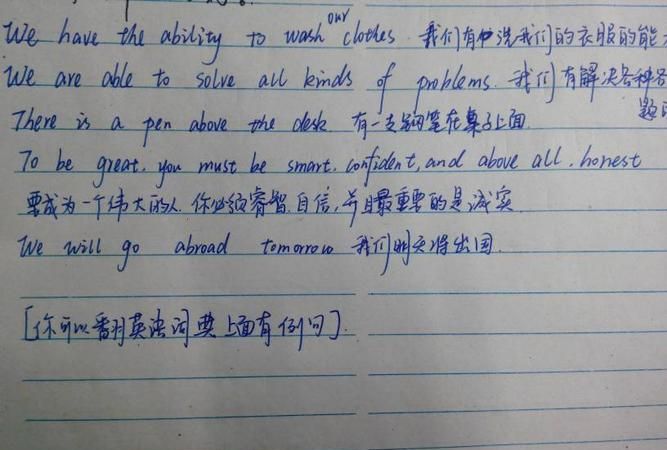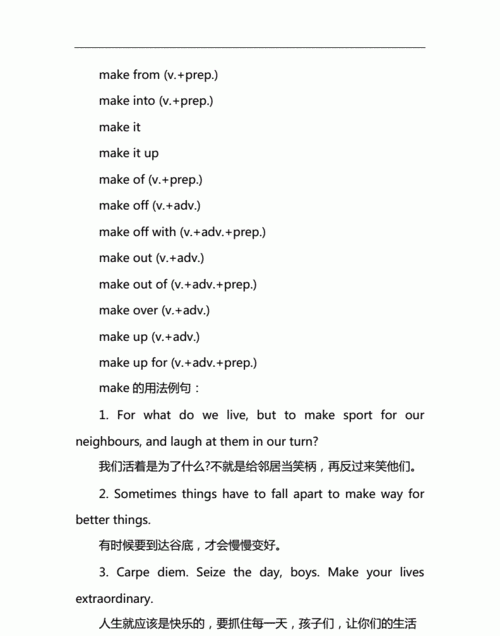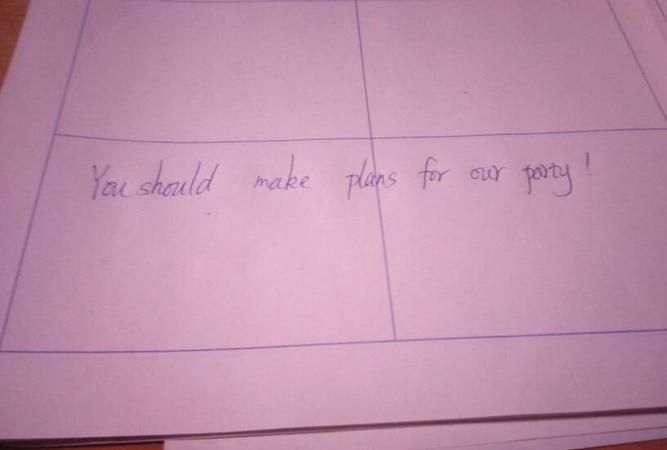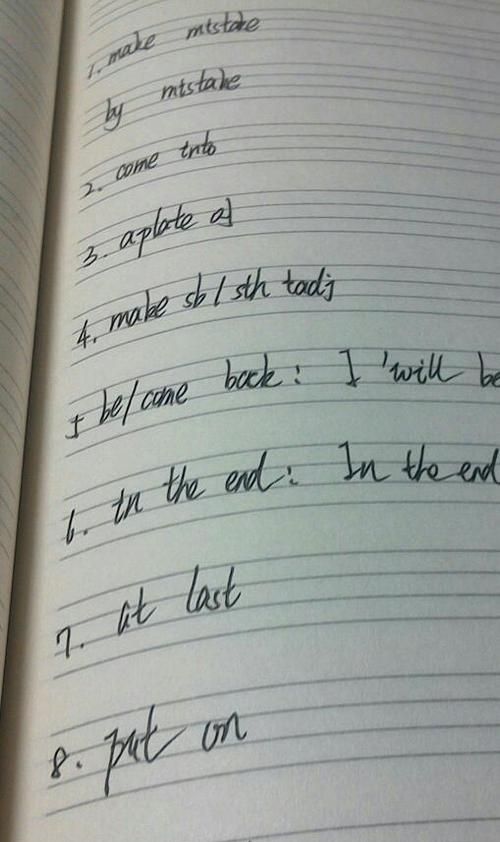本文目录
do和make的用法区别
do/make 两词均有“做”之意,用法与含义相近,不易掌握。
现将其宾语作一比较:
1.说起某种活动而又不确指什么活动时,用do。如:
Do somehing! 做点什么吧!
I don't know what to do. 我不知道该做什么好。
2.做出以前没有的东西时,常用make,有“创造;建造”之意;而进行某种活动时用do。如:
Let us make a model plane. 我们来做个飞机模型吧。
He has not done his homework. 他没做完家庭作业。
3.谈及工作时一般用do。如:
I'm not going to do any work. 我将什么工作也不做。
4.make侧重于“制造”,而do侧重于“完成,做到”。如:
Study well and make progress every day. 好好学习,天天向上。
Will you do me a favor? 帮我一把好吗?
We do not do much business with them? 我们不常跟他们做生意。
5.有些名词能作两者的宾语且语义相同,但make 比do显得具体、形象,动作性也强。如: I'll do / make a translation for you. 我来替你当翻译。 She did some pretty sketches. 她画了几张漂亮的素描。 He made some sketches of the dancing children.他画了几张儿童跳舞的素描。 6.比较下列句子:
Have you done the chairs? 你把椅子擦好了吗?
Have you made the chairs? 你把椅子做好了吗?
They are doing the dishes. 他们在洗盘子。
The workers are making the dishes. 工人们在造盘子。
7.除上述2、3、4各条固定表达法外,下列搭配中也不可将do和make换用。
make a speech 发言;make money 赚钱;make war 开战;make peace讲和;make coffe 煮咖啡; make tea 沏茶;make a road 筑路; make a poem 作诗;make a promise 许愿;make a decision 作决定;make a sentence 造句;make friends 交朋友;make enemies 树敌;make the bed 铺床;make a face 扮鬼脸;make a mistake 犯错误 ;do good 做好事;do evil 作恶:do one's bit 出一份力;do one's best 尽力;do a good job 搞好工作;
make:是使役动词,后跟随动词原形,但在被动语态中,它后面得跟to do形式. 所谓宾语补足语:进一步说明那宾语的特征状态或是性质, 可担任宾语补足语的有:形容词,分词(现在分词和过去分词),介词短语,doing 以keep为例来说明常用的五种补足语的用法:
1.We must keep our classroom clean(这儿的clean就是形容词----我们必须保持我们教室的干净) 2.He keeps me waiting for an hour(waiting 就是doing形式---他让我等了一个小时)
3.I'm ill,The doctor keeps me ih bed(in bed就是介词短语---我病了,医生让我卧床)
4.The other students ih the class keep their mouths shut(shut就是过去分词---班上的其他学生都是闭嘴)
5.The doctor kept me in for a week(in就是副词----医生让我呆在家中一个星期.注:两个介词在一起时,通常情况下前一个介词便成了副词).

用make的用法造句
1.I want to make a cake.
2.He makes her a cake.
3.The noise makes me mad.
4.He makes himself in.
5.My mother makes me study.
6.The workers are made to do the work by the boss.

"make"的几种用法分别是啥
make [meik]
v.做, 制造, 使得, 赚(钱), 成功, 达成
n.性格, 式样, 制造, 生产量
例句:
The stone made a dent in the roof of my car.
我的汽车顶让石头砸了个坑。
I couldn't make my car start this morning.
今天早晨我的汽车发动不起来了。
She would have made an excellent teacher.
她本可以成为杰出的教师。
讲解:
【词源解说】
直接源自古英语的macian;最初源自西日耳曼语的makojanan。
【语法用法】
make后接不定式时的用法:用在make+宾语+动词的不定式中时,动词前面不能加to,这时是“使、让某人(或某物)做”的意思。
I made her cry.
我让她哭了。
make在被动用法中,动词前必须要加上to。
She is made to repeat the whole story.
她被要求重述一遍整个故事。
但是如果make是单纯“制造”的意思,to不能省略。
He made our shoes to last.
他把我们的鞋做的结实耐穿。
另外,在谤语里make的宾语后面的不定式的to也不可省略。
Money makes the mare to go.
有钱能使鬼推磨。
make 1
/ meɪk; mek/ v (pt, pp made / meɪd; med/)
CONSTRUCTING OR CREATING 建造或创造
(a) [Tn, Tn.pr, Dn.n, Dn.pr] ~ sth (from/(out) of sth); ~ sth (for sb) construct, create or prepare sth by combining materials or putting parts together (用材料或零件)做﹑ 制作﹑ 制造﹑ 建造或创造某物: make a car, a dress, a cake 制造汽车﹑ 做连衣裙﹑ 做蛋糕 * make bread, cement, wine 做面包﹑ 制水泥﹑ 酿葡萄酒 * make (ie manufacture) paper 造纸 * God made man. 上帝创造了人类. * She makes her own clothes. 她的衣服都是她自己做的. * Wine is made from grapes. 葡萄酒是用葡萄酿制的. * `What is your bracelet made of?' `It's made of gold.' ‘你的镯子是什麽材料做的?’‘是金的.’ * I made myself a cup of tea. 我自己沏了一杯茶. * She made coffee for all of us. 她给我们大家煮了咖啡. * This car wasn't made (ie is not big enough) to carry eight people. 这辆汽车不是坐八个人的. (b) [Tn.pr esp passive 尤用於被动语态] ~ sth into sth put (materials or parts) together to produce sth 将(材料或零件)做成或制成某物: Glass is made into bottles. 玻璃可制成瓶子. (c) [Tn] arrange (a bed) so that it is ready for use 铺(床): Please make your beds before breakfast. 请在早饭前把床铺好.
[Tn, Tn.pr] cause (sth) to appear by breaking, tearing, removing material or striking (藉打破﹑ 撕破﹑ 移去材料或敲击)使(某物)出现, 形成: The stone made a dent in the roof of my car. 我的汽车顶让石头砸了个坑. * The holes in the cloth were made by moths. 布上的洞是虫子蛀的.
[Tn] create (sth); establish 制定(某事物); 规定: These regulations were made to protect children. 这些规则是为保护儿童而制定的. * Who made this ridiculous rule? 这条荒唐的规则是谁定的?
[Tn] write, compose or prepare (sth) 写, 创作, 准备(某事物): make one's will 立遗嘱 * make a treaty with sb 与某人签订协议 * She has made (ie directed) several films. 她已导演了几部影片. * I'll ask my solicitor to make a deed of transfer. 我要找律师拟一份让据书.
CAUSING TO BECOME, DO OR APPEAR 使变为..., 做...或显得...
[Tn] cause (sth) 产生, 引起(某事物): make a noise, disturbance, mess 产生噪音﹑ 骚乱﹑ 混乱 * She's always making trouble (for her friends). 她总(给朋友)惹麻烦.
[Cn.a] cause (sb/sth) to be or become 使(某人[某事物])成为, 变为, 变成, 变得: The news made her happy. 这消息使她很高兴. * She made clear her objections/made it clear that she objected to the proposal. 她明确表示反对此提案. * His actions made him universally respected. 他的行为使他受到普遍尊敬. * Can you make yourself understood in English? 你能用英语把意思表达清楚吗? * The full story was never made public. 详情从未公之於众. * She couldn't make herself/her voice heard above the noise of the traffic. 来往车辆噪声很大, 她无法让别人听到她的声音.
[Cn.i] (a) force or compel (sb) to do sth 强迫, 迫使(某人)做某事物: They made me repeat/I was made to repeat the story. 他们逼我又把那事讲了一遍. * She must be made to comply with the rules. 必须强迫她遵守这些规则. * He never tidies his room and his mother never tries to make him (do it). 他从不整理自己的房间, 而他母亲也从未想逼他(整理). =>Usage at cause 用法见cause. (b) cause (sb/sth) to do sth 使(某人[某事物])做某事物: Onions make your eyes water. 洋葱能刺激眼睛流泪. * Her jokes made us all laugh. 她说的笑话把我们都逗乐了. * I couldn't make my car start this morning. 今天早晨我的汽车发动不起来了. * What makes you say that? 是什麽原因让你说出那种话来? * I rang the doorbell several times but couldn't make anyone hear. 我摁了几次门铃, 但没人应. * Nothing will make me change my mind. 无论什麽事都不能使我改变主意.
[Cn.a, Cn.n, Cn.i] represent (sb/sth) as being or doing sth 使(某人[某事物])表现出某状况: You've made my nose too big, eg in a drawing or painting. 你把我的鼻子画得太大了. * The novelist makes his heroine commit suicide at the end of the book. 那小说作者在书的结尾让他的女主人公自杀了.
[Cn.n] elect (sb); appoint 选举(某人); 指派: make sb king, an earl, a peer, etc 拥戴某人当国王﹑封某人为伯爵﹑ 封某人为贵族 * He was made spokesmanby the committee. 委员会派他当发言人. * She made him her assistant. 她委派他作自己的助手.
[Tn.pr, Cn.n] ~ sth of sb/sth cause sb/sth to be or become sth 使某人[某事物]处於某状况或变成某事物: We'll make a footballer of him yet, ie turn him into a good footballer despite the fact that he is not a good one now. 我们还是要把他造就成优秀的足球运动员(虽然他现在还不是). * This isn't very important I don't want to make an issue of it. 这并不十分重要--我不想使其成为争论之点. * Don't make a habit of it/Don't make it a habit. 不要养成那样的习惯. * She made it her business (ie special task) to find out who was responsible. 她非要弄清是谁的责任不可.
BEING OR BECOMING SOMETHING 成为...或变为...
[Ln] be or become (sth) through development; turn out to be 演变成(某事物); 结果是: If you train hard, you'll make a good footballer. 你要刻苦训练就能成为优秀的足球运动员. * He'll never make an actor. 他决当不成演员. * She would have made an excellent teacher. 她本可以成为杰出的教师.
[Ln] serve or function as (sth); constitute 用作(某事物); 起(某事物)的作用; 组成; 构成: That will make a good ending to the book. 那就成了这本书很好的结尾. * This hall would make an excellent theatre. 这座大厅可当作极好的剧院.
[Ln] add up to (sth); equal; amount to; constitute 合计等於(某数); 总计; 构成: 5 and 7 make 12. 5加7等於12. * A hundred pence make one pound. 一百便士为一镑. * How many members make a quorum? 起码的法定人数是多少? * His thrillers make enthralling reading. 他的惊险小说引人入胜. * The play makes a splendid evening's entertainment. 这出剧是极好的晚间消遣.
[Ln] count as (sth) 算做(某事物): That makes the tenth time he's failed his driving test! 他驾驶测验不及格, 这次算第十次了!
GAINING OR WINNING 获得或赢得
[Tn] earn (sth); gain; acquire 赚得(某事物); 获得; 取得: She makes 15000 a year. 她一年挣15000英镑. * make a profit/loss 盈利[亏损] * He made a fortune on the stock market. 他在股票交易中发了财. * How much do you stand to make? 你决计要赚多少钱?
[Tn] (in cricket) score (sth) (在板球中)得(若干)分: England made 235 for 5. 英格兰队5名击球手共得235分. * Botham made a century. 博瑟姆得了一百分.
(in card games, esp bridge 用於牌戏, 尤於桥牌中) (a) [Tn] win a trick with (a particular card) 打(某张牌)赢一墩: She made her ten of hearts. 她打出红桃十赢了一墩. (b) [Tn] win (a trick) or fulfil (a contract) 赢(一墩); 完成(一定约墩数的约定). (c) [I, Tn] shuffle (the cards) 洗(牌): It's my turn to make. 该我洗牌了.
[Tn] (sl sexist 俚, 性别偏见) succeed in having sex with (a woman) 与(某女子)性交: The guy doesn't make the girl until the last chapter. 直到最後一章那个男子才和那个姑娘发生了性关系.
OTHER MEANINGS 其他意义
[no passive 不用於被动语态: Cn.a, Cn.n, Cn.t] calculate or estimate (sth) to be (sth) 计算, 估计(某事物): What time do you make it?/What do you make the time? 你说现在几点了? * How large do you make the audience? 你估计听众有多少? * I make the total (to be) about 50. 我看总数大约50英镑. * I make the distance about 70 miles. 我估计那段距离约有70英里.
[Tn no passive 不用於被动语态] (a) travel over (a distance) 走过(一段距离): We've made 100 miles today. 我们今天已走了100英里. (b) reach or maintain (a speed) 达到, 保持(某速度): Can your car make a hundred miles per hour? 你的汽车一小时能开一百英里吗? (c) manage to reach (a place) 设法到达(某处): D'you think we'll make Oxford by midday? 我们中午能到牛津吗? * The train leaves in five minutes we'll never make it, ie reach the station in time to catch it. 火车再有五分钟就开了--我们绝对赶不上了. * I'm sorry I couldn't make your party last night. 很抱歉, 昨晚我没能参加你们的聚会. * Her new novel has made (ie sold enough copies to be in) the best-seller lists. 她的新小说已列入畅销书目了. * She'll never make (ie win a place in) the team. 她绝对进不了那个运动队. * He made (ie reached the rank of) sergeant in six months. 他六个月後就当上了中士. * The story made (ie appeared on) the front page of the national newspapers. 这件事刊登在全国各报的第一版上.
[Tn, Dn.n] put (sth) forward; propose; offer 提出(某事); 提议; 提供: Has she made you an offer (ie said how much money she would pay you) for your car? 她说过她愿出多少钱买你的汽车吗? * make a proposal 提出建议 * The employers made a new offer (ie of a rise in wages) to the work-force. 雇主向工人提出增加工资的新建议. * I made him a bid for the antique table. 我向他出了个价, 要买那张古董桌子.
[Tn] cause or ensure the success of (sth) 促成, 确保(某事): A good wine can make a meal. 有了好酒饭就香. * It was the beautiful weather that really made the holiday. 是好天气成全了假日之美.
[It] behave as if one is about to do sth 表现出要做某事物的样子: He made as if to strike her. 他做出要打她的架势. * She made to go but he told her to stay. 她好像要走, 但他叫她留下.
eat or have (a meal) 吃(饭); 进(餐): We make a good breakfast before leaving. 我们动身前好好吃顿早饭. * She made a hasty lunch. 她匆匆吃了午饭.
(Often used in a pattern with a n, in which make and the n have the same meaning as a v similar in spelling to the n 常用於与名词连用的句型中, 其中make和名词之组合与该名词相应之动词同义, 如 make a decision, 即 decide; make a guess (at sth), 即 guess (at sth); for other expressions of this kind, see entries for ns 查阅类似词组见有关名词词条)
(idm 习语) make do with sth; make (sth) `do manage with sth that is not really adequate or satisfactory 用某事物勉强应付; 将就; 凑合: We were in a hurry so we had to make do with a quick snack. 我们时间很紧, 只好胡乱吃了顿小吃. * There isn't much of it but you'll have to make (it) do. 东西不多, 你只好将就了. make `good become rich and successful 变富; 获得成功: a local boy made good, eg as a businessman 一个发迹的本地男子. make sth good (a) pay for, replace or repair sth that has been lost or damaged 赔偿﹑ 替换或修理损坏之物: She promised to make good the loss. 她答应赔偿损失. * make good the damage 修复损坏之物 * The plaster will have to be made good before you paint it. 要先重新抹好灰泥再刷浆. (b) carry sth out; fulfil sth 履行某事; 实现某事: make good a promise, threat, etc 履行诺言﹑ 进行威胁. `make it (infml 口) be successful in one's career 事业上获得成功: He's never really made it as an actor. 他当演员从未有所成就. make the most of sth/sb/oneself profit as much as one can from sth/sb/oneself 从某事物[某人/自己]处获取尽可能多的好处: make the most of one's chances, opportunities, talents, etc 充分利用时机﹑ 机会﹑ 才能等 * It's my first holiday for two years so I'm going to make the most of it. 这是我两年来的第一个假日, 所以要好好利用一下. * She really tries to make the most of herself, eg by dressing well. 她确实想尽量发挥自己的优势(如穿着漂亮). make much of sth/sb (a) (in negative sentences and questions 用於否定句和疑问句) understand sth 理解某事物: I couldn't make much of his speech it was all in Russian. 他的演讲我大部分都听不懂--全是用俄语讲的. (b) treat sth/sb as very important; stress or emphasize sth 非常重视某事物[某人]; 强调某事物: He always makes much of his humble origins. 他总强调自己出身卑微. * She was always made much of by her adoring friends. 她的朋友总是那麽崇拜她. make nothing of sth easily achieve sth that appears to be difficult; treat sth as trifling 轻易做好貌似困难之事; 对某事物满不在乎. make or break sb/sth be crucial in making sb/sth either a success or a failure 为某人[某事物]成败的关键: The council's decision will make or break the local theatre. 政务委员会将要决定当地剧院的命运. * [attrib 作定语] It's make-or-break time for the local theatre. 这是当地剧院存亡攸关的时刻. (For other idioms containing make, see entries for ns, adjs, etc 查阅与make搭配的其他习语, 见有关名词﹑ 形容词等的词条, 如 make love => love1; make merry => merry. )

用make造句子并翻译
I‘d like to make friends with you我愿与你交朋友
Please help me make up a dialoge with the word请帮我用这词编个对话
Make yourself at home随意
Don't make him cry 别让他哭
It is made in China中国造

以上就是关于make的五种用法造句 ,do和make的用法区别的全部内容,以及make的五种用法造句 的相关内容,希望能够帮到您。

